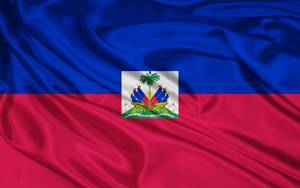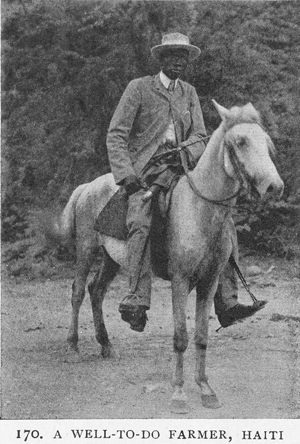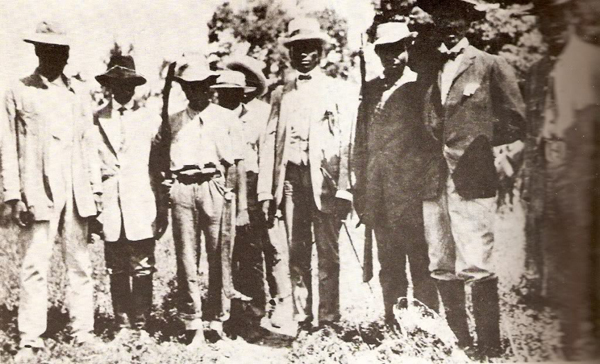HAITI : Charlemagne Peralte - Haitian Hero, ‘Supreme Bandit’ of First US Occupation (Part 2)
By Dady Chery, Haiti Chery, May 18th 2012
http://www.dadychery.org/2012/05/18/charlemagne-peralte-haitian-hero-sup...
On Monday August 30, 1915, Leogane Military Commander Charlemagne Peralte refused to surrender the Haitian flag and his weapons to the U.S. Marines who had been disarming the country. Peralte told the Marines he would only obey a formal order from the Haitian President. For his refusal to surrender his flag and weapons without a fight, Peralte was dismissed from Haiti’s Army. He returned to a quiet life of farming in his home town of Hinche, in central Haiti,. His resistance to the U.S. occupation might well have ended there if a few months later, the U.S.-controlled Gendarmerie (later called the Forces Armees d’Haiti, FAd’H) had not also come for his person and property.
On the pretext that Charlemagne and Saul Peralte had attacked the Gendarmerie headquarters in Hinche, U.S. officials arrested the brothers and had Charlemagne’s house burned down and Saul’s house plundered on the night of October 11, 1917. The brothers were submitted to a court martial that sentenced Saul to death; he was executed by a Haitian gendarme on the orders of two U.S. officers.
Charlemagne, for his part, was sentenced to 5 years of hard labor in the city of Cap Haitien, where his friends and relatives were made to observe him in prison clothes and with his head shaved in jobs like sweeping the streets. To the minds of the Marines who had come mostly from the U.S. south, this show of force among many would earn them the respect of Haitians, but their overt racism only served to earn them more contempt. Additional collective humiliations from the U.S. included the collection of taxes from Haitians for use to service the foreign debt.
Though respect is not easily gained in Haiti, Charlemagne Peralte and his family had plenty of it. His father, General Remi Massena Peralte, was a land-owning farmer and rancher who had served the country as a member of parliament during the well-regarded administration of president Hyppolite. Charlemagne Peralte (born François Borgia Charlemagne Péralte on 10 October 1885) had completed his studies at the well-reputed St. Louis de Gonzague college in Port-au-Prince before becoming a career officer in the Haitian army. Before his downfall, he had been a well sought out handsome bachelor and an excellent dancer and hunter.
After nearly a year of forced labor, Charlemagne Peralte escaped, with the help of a friend who gave him refuge and disguises. Within a month, Peralte had recruited over 200 rebels, called the Cacos, from the ranks of laboring and escaped convicts, all of whom swore to “drive the Americans back into the sea.”
The Peraltiste Cacos started out armed with only vintage guns and swords from the Haitian revolution, hunting rifles, machetes, and knives, but they quickly stocked themselves with modern weapons and ammunition by initially raiding the most remote outposts of the Gendarmerie. They attacked the enemy in surprise commando operations and used guerilla tactics that favored their mastery of the difficult terrain, particularly along the border of Haiti and the Dominican Republic. Soon Peralte was joined in leading the anti-U.S. war by Mirebalais schoolteacher Benoît Batraville. During the next few months of battle, Peralte would control the north and Battraville the Artibonite region. The Cacos soon grew to include thousands of armed guerillas, including many Dominicans won over by Peralte to the anti-imperialist cause, and Peralte was able to declare a provisional government in northern Haiti.
In 1918, Charlemagne Péralte issued the following call to arms.
People of Haiti!
Soon a day like the 1st of January 1804 will rise. For four years the Occupation has been insulting us constantly. Each morning it brings us a new offense. The people are poor and the Occupation still oppresses us with taxes. It spreads fires and forbids us to rebuild wooden houses under the pretext of keeping the city beautiful.
Haitians, let us maintain and follow the Belgian example [a reference of the resistance of Belgians against a German invasion during WWI]. That they burn down our cities does not matter because, as the epitaph of the great Dessalines tells us. the nation will rise as the cities vanish.”
The holy battle in the North is led by brave citizens. The South is only waiting for the right man to follow its wonderful example. Don’t worry, we have the arms. Let’s get rid of those savage people, whose beastly character is evident in the person of their President Wilson—traitor, bandit, trouble maker, and thief.
Die for your country.
Long live Independence!
Long live the Union!
Long live the just war!
Down with the Americans!
From Charles the Great Massena Peralte, High Commander of the Haitian Revolution
Peralte also wrote the following letter to the French Minister in Haiti:
Port-au-Prince
Honored Minister,
Despite the principles, of international law usually adopted by civilized nations, and coming out of Great War in Europe, the American Government got involved in the internal affairs of the small republic of Haiti and imposed a rule whose approval by the Haitian Parliament was guaranteed enforced by military occupation.
We were ready to accept this rule and follow its obligations, despite the threat to our autonomy and the dignity of our free and independent people. But the false promises, given by the Yankees, when they invaded our land, brought in almost four years of continuous insults, incredible crimes, killings, theft and barbarian acts, the secrets of which are known only to Americans.
Today we lost patience and we reclaim our rights, rights, ignored by the unscrupulous Americans, who by destroying our institutions deprive the people of Haiti of all its resources and devour our name and our blood. For four years, cruel and unjust Yankees brought ruin and hopelessness to our territory. Now, during the peace conference and before the whole world, the civilized nations took an oath to respect the rights and sovereignty of small nations. We demand the liberation of our territory and all the advantages given to free and independent states by international law. Therefore, please take into consideration that ten months of fighting has been in pursuit of this aim and that our victories give us the right to ask for your recognition.
We are prepared to sacrifice everything to liberate Haiti, and establish here the principles affirmed by President Wilson himself: the rights and sovereignty of small nations. Please note, honored Consul, that American troops, following their own laws, don’t have any right to fight against us.
Dear Sirs, please, accept our distinguished salutations.
Signed by the High Commander of the Revolution
M. Peralte
followed by 100 other signatures
Although the U.S. occupiers took care always to refer to the Peraltiste Cacos as a group of “bandits” and “highwaymen,” they realized that a revolution was under way, and the corrupt Gendarmerie could not hold it off. And so they quietly began to upgrade the Marine contingent. The subsequent U.S. campaign against the Cacos would involve some of the worst atrocities by the U.S. during its Latin-American imperialist forays. It would also swell the Cacos’ ranks to over 40,000.






